SPARC Plug Summer 2024
Originally published 2024/08/22
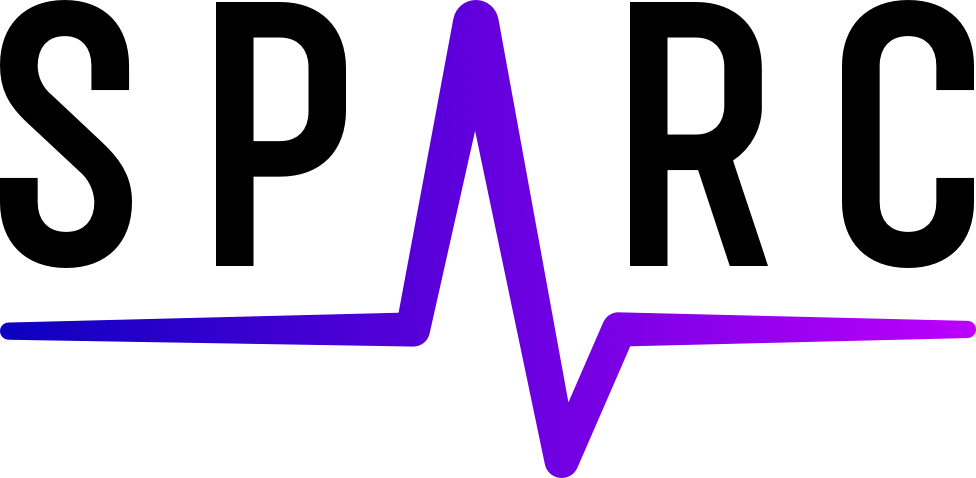
Click the above link, re-select newsletter issue from sidebar, then select desired language from above.
SPARC News
Global SPARC FAIR CODEATHON winners
Showcasing their problem-solving methodologies, codeathon teams composed of members from 10 different countries created innovative solutions to demonstrate and expand the utility and interoperability of the SPARC Portal in the fourth annual SPARC FAIR Codeathon that ran Aug 10-12. With pleasure, we invite you all to view all presentations by the SPARC Codeathon team at the following link 2024 SPARC codeathon winners. You can also find all previous SPARC Codeathon projects on the SPARC YouTube channel and the SPARC Portal.
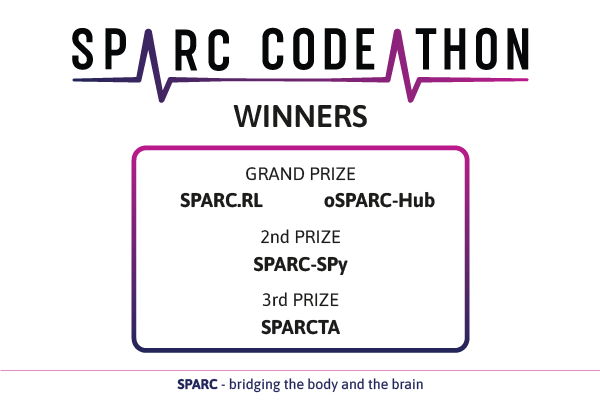
SPARC Codeathon 2024 Winners
Grand Prize SPARC.RL, oSPARC-Hub 2nd Prize: SPARC-SPy 3rd Prize: SPARCTA
Updates to the SPARC Portal user experience
Here’s a quick look at recent updates to the portal.
- The link to Maps in the top level navigation has been replaced with a link to SPARC Apps, which brings you to a landing page where Maps, as well as other apps, like the o2S2PARC platform, can be found. Watch this page for more apps to come.
- Improvements to the homepage include highlighting the consortia supported by SPARC, and tallying total contributions.
Learn about these and more changes here.
Learn about these and more changes on our SPARC Change Log page.
Thank you to all who have participated in our in-person user research activities at conferences, as well as our remote research efforts. These design changes are informed by your feedback, which we truly value. If you’d like to provide feedback through upcoming user research studies, reach out to our team at [email protected]. Thank you in advance for your interest.
2024 King’s Birthday Honors bestowed on SPARC Community members
Professor Peter Hunter, founder of the Auckland Bioengineering Institute and Principal Investigator for the mapping core of the SPARC Data and Resource Center, was appointed a Knight Companion of the New Zealand Order of Merit for services to medical science. Read more about this honor here.
Professor John Furness, Dept. Anatomy & Physiology at the University of Melbourne, received the Officer of the Order of Australia for his distinguished service to medical research in the field of autonomic neuroscience and neurogastroenterology. Read more about this honor here.
Our warmest congratulations to Professors Hunter and Furness.
SPARC featured in recent MIT Tech Review article
SPARC has been featured in the MIT Technology Review. ‘The messy quest to replace drugs with electricity’. Read how the SPARC program has provided crucial details on the peripheral nervous system’s electrical aspects.
Remembering Gary
SPARC lost a valuable member of our team this year. Dr. Gary Mawe, distinguished neuroscientist known for his pioneering research on the enteric nervous system, passed away on February 17, 2024. Widely respected for his contributions to understanding the complex interactions between the gut and the brain, his work elucidated how the enteric nervous system regulates gut motility and how disturbances in this system can contribute to conditions like irritable bowel syndrome.
Gary’s legacy includes not only his scientific discoveries but also his mentorship and dedication to advancing the field of neurobiology. Gary was a founding member of the SPARC Anatomy Working Group (SAWG), the behind-the-scenes group of anatomists who harmonize and define the diverse and often perplexing anatomical nomenclature to enable the ambitious SPARC efforts to link knowledge across species and scale. In weekly meetings, Gary and the SAWG team would dive deep into the tangled web of taxonomic classifications, challenged to unravel the dense, scientific knot of historical naming conventions, scientific whimsy, and linguistic quirks. His anatomical knowledge was unparalleled and deeply appreciated; SPARC curators often found that a few minutes with him replaced hours of diving into the literature.
This summer, colleagues, students, and friends wearing tropical print shirts (signature apparel of Dr. Mawe), gathered in a celebration of Gary’s life at the University of Vermont, where he was a distinguished professor. SPARC will miss Gary, both as a scientist and as a person. A fitting tribute to Gary is available here: https://doi.org/10.1111/nmo.14807
SPARC publishes first annual public report
Download the SPARC annual public report
In this report, the DRC discusses progress on both technological development and our efforts to foster and grow the SPARC community over the past year. We offer many opportunities for the community to get involved; we hope to hear from you.
KURe scholar opportunity
Any PhD student graduating in the next year is eligible
A space is open in the KURe at Duke for a postdoc, or equivalent, working on Benign Urology with any number of excellent mentors. Multiple mentors on collaborative projects are possible, as well. This position pays for salary and includes independent money for research.
Application deadline is September 9, 2024
Anticipated Scholar start date is October 1, 2024
This position opens up regularly, so any student finishing their PhD in the next couple of years should keep this in mind.
Find more information about the KURe scholar opportunity.
We’re launching a SPARCtacular push for open science!
Help us grow!
Share your data on the SPARC Portal
SPARC serves to bridge the body and the brain as a platform for sharing peripheral, autonomic and systems physiology research. Our ambitious goal to demonstrate the feasibility of FAIR, accessible science needs your participation. You are invited to contribute your data, device designs, and models to the SPARC Portal.
Showcase your work in a webinar or conference session
We’re offering a few opportunities for people to highlight their research in an online webinar or conference session hosted by SPARC. If this interests you, reach out to us at [email protected].
Stay up to date
Be sure to receive SPARC news, including announcements about upcoming community events and collaborations during Open Science Week, September 16 through 22 by joining our mailing list.
SPARC was at ISAN
The biennial International Society of Autonomic Neuroscience conference convened in England, UK, in late July. The Cardiac Neurobiology: Concepts to Clinic meeting kicked off in a classic lecture hall at Oxford University, which, as proudly shared by host, Dr. David Paterson, is the home of Dr. Denis Noble, who was in attendance, and the largest physiology department in the world.
The event featured many SPARC voices, including Drs Shivkumar, Ajijola, Cheng, and Habecker sharing recent developments and views for the future advancement in cardiac research. Continuing for a second day, Drs Efimov, Osborn, Vadigepalli, and Hunter were among the presenters that shared insights and current efforts in modeling and therapeutic translation. A closing reception at the Oxford Museum of History provided a stimulating opportunity for all to discuss the bright future of cardiovascular neurobiology in the company of dinosaurs and dodos.
Dr. Keith Brain welcomed ISAN conference attendees to Birmingham, where fundamental and clinical perspectives in autonomic neuroscience research took center stage.
Since the SPARC Portal currently hosts autonomic and integrative systems research from more than 575 contributors (to date), it is no surprise that the SPARC community was well represented. The SPARC team held a two hour symposium demonstrating the use of SPARC infrastructure by the REVA and REVEAL teams. Each of the 4 talks had two speakers with specific use cases marrying infrastructure with research.
- Dr. Maryann Martone spoke about ingesting and storing clinical trial data from the REVEAL project.
- Drs. Alan Garny and Igor Efimov demonstrated examples of how this project’s data can be used in modeling.
- Dr. Nicole Pelot, part of the REVA project, together with Dr. Joost Wagennar, DRC, demonstrated possibilities for visualizations on a project specific dashboard as part of the SPARC Portal.
- Dr. Mabelle Lin, DRC, and Dr. Ariege Bizanti have been collaborating on SPARC for a number of years and the talk walked the audience through how research data is mapped to a common coordinate framework organ scaffold.
The SPARC booth provided a space for further discussions and interactions with attendees. In all, the ISAN conference provided a great occasion to share current research spanning the bench to clinic, wet lab to biophysical modeling, and in silico to device, in diverse topics across the field of autonomic neuroscience.
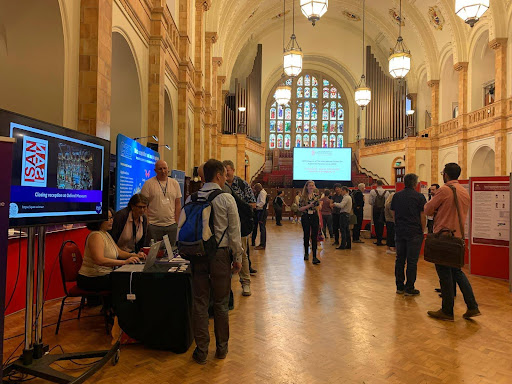
SPARC exhibitor booth at ISAN
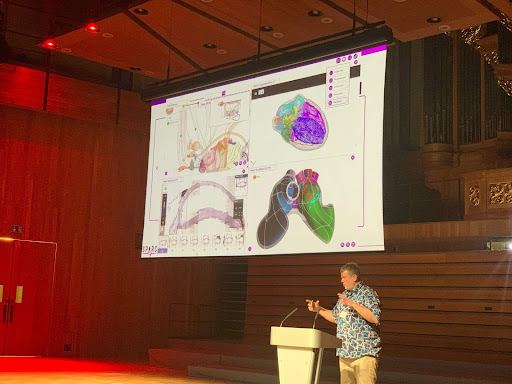
Dr David Nickerson's talk on – Interactive maps of nerve-organ anatomy and function on the SPARC Portal
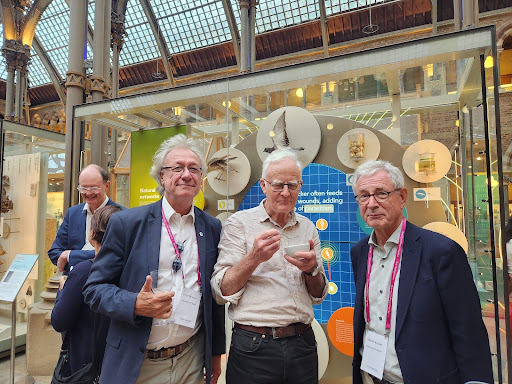
Dr. Paterson, Sir Peter Hunter and Dr. Buchan enjoying a moment at the Oxford Museum of History
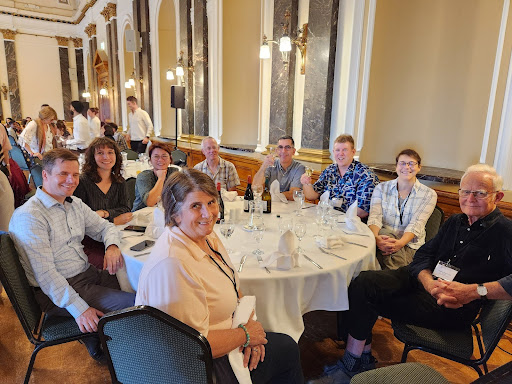
The global SPARC DRC celebrated a rare chance to spend time together in person at the Birmingham Council House, an impressive backdrop for the ISAN closing reception.
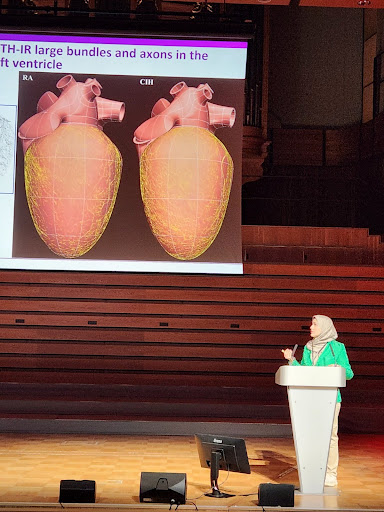
Dr. Bizanti presents cardiac innervation changes in a model of intermittent chronic hypoxia using 21st century finite-element models developed by SPARC DRC.
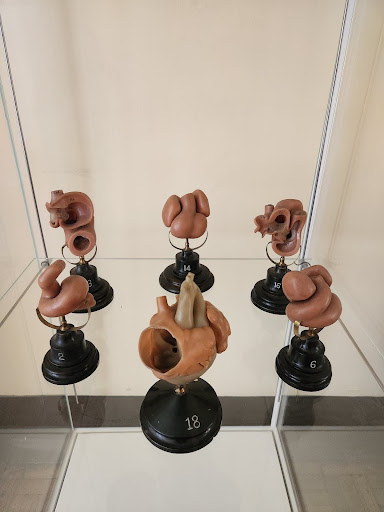
Conference attendees enjoyed viewing a set of wax models of the human heart, made at the Ziegler Studio during the 19th century. These models are part of a wider collection of historic teaching aids, which is held by the University of Birmingham.
New supplement opportunity for those with existing funding
Great news for those with ACTIVE grants! There’s a new opportunity to add on a supplement that focuses on data reuse and secondary data analysis in NIH-funded data repositories and knowledge bases. If you plan to work with SPARC in the future and need assistance with your Data Management and Sharing Plan, we’re here to help. Reach out for support.
Read more about supplemental funding.
Funding Opportunities
Title: Mission Office-specific Innovative Solutions Openings (ISOs)
- Agency/Organization: Advanced Research Projects Agency for Health (ARPA-H)
- Expiration: Varied
- Link: https://arpa-h.gov/research-and-funding/mission-office-iso
Title: Notice of Special Interest (NOSI): Administrative supplements to active Common Fund awards to support replication studies [NOT-RM-24-009]
- Agency/Organization: National Institutes of Health (NIH)
- Expiration: Sept 30, 2024
- Link: https://grants.nih.gov/grants/guide/notice-files/NOT-RM-24-009.html
Title: Whole Person Research and Coordination Center (Whole Person RCC) U24 (Clinical Trial Not Allowed) [RFA-AT-24-010]
- Agency/Organization: National Institutes of Health (NIH)
- Expiration: Oct 1, 2024
- Link: https://grants.nih.gov/grants/guide/rfa-files/RFA-AT-24-010.html
Title: Notice of Special Interest (NOSI): Clinical and Translational Science Award (CTSA) Program: Collaborative and Innovative Acceleration Award (UG3/UH3) (Clinical Trial Optional) for Advancing Recruitment through Trial Innovation Network (AR-TIN)
- Agency/Organization: National Center for Advancing Translational Sciences (NCATS) and National Human Genome Research Institute (NHGRI)
- Expiration: Oct 18, 2024
- Link: https://grants.nih.gov/grants/guide/notice-files/NOT-TR-23-026.html
Title: HEAL Initiative: Understanding Individual Differences in Human Pain Conditions (R01 - Clinical Trial Optional)
- Agency/Organization: National Institutes of Health (NIH)
- Expiration: Feb 7, 2025
- Link: https://grants.nih.gov/grants/guide/rfa-files/RFA-NS-24-021.html
Title: Developing Regulated Therapeutic and Diagnostic Solutions for Patients Affected by Opioid and/or Stimulants use Disorders (OUD/StUD) (R41/R42 Clinical Trial Optional)
- Agency/Organization: National Institutes of Health (NIH)
- Expiration: Feb 15, 2025
- Link: https://grants.nih.gov/grants/guide/rfa-files/RFA-DA-24-038.html
Title: HEAL INITIATIVE: Development of Therapies and Technologies Directed at Enhanced Pain Management (R43/R44 Clinical Trial Not Allowed)
- Agency/Organization: National Institutes of Health (NIH)
- Expiration: April 5, 2025
- Link: https://grants.nih.gov/grants/guide/rfa-files/RFA-NS-23-006.html
Title: HEAL Initiative: Interdisciplinary Team Science to Uncover the Mechanisms of Pain Relief by Medical Devices (RM1 Clinical Trial Optional)
- Agency/Organization: National Institutes of Health (NIH)
- Expiration: June 10, 2025
- Link: https://grants.nih.gov/grants/guide/rfa-files/RFA-NS-23-028.html
Title: BRAIN Initiative: New Technologies and Novel Approaches for Recording and Modulation in the Nervous System (R01 Clinical Trial Not Allowed)
- Agency/Organization: National Institutes of Health (NIH)
- Expiration: Jan 21, 2026
- Link: https://grants.nih.gov/grants/guide/rfa-files/RFA-NS-24-004.html
Title: Notice of Special Interest (NOSI): Promoting Data Reuse for Health Research [NOT-OD-24-096]
- Agency/Organization: National Institutes of Health (NIH)
- Expiration: Nov 4, 2026
- Link: https://bit.ly/4aQ34pN
Conferences
Find SPARC at the Society for Neuroscience Annual Meeting
October 5-9 2024, Chicago IL
Annually, scientists worldwide meet to explore new ideas, exchange research findings, and immerse themselves in their field. Attend to present research, network, participate in sessions, and join the global neuroscience community at the SFN annual meeting.
Attending? Find SPARC at Booth #1764.
Presenting? If your peripheral nervous system abstract is accepted by SfN, let us know! We would love to see it. Send to [email protected]!
New Webinars/Tutorials
The 4DN Data Portal - Data, Resources And Tools To Help Elucidate Nuclear Organization In Space And Time
The recorded dkNET webinar and slides are available for a presentation made by Dr. Andrew Schroeder on Friday, May 10, 2024.
Andrew Schroeder, PhD., is the Project Manager & Senior Data Curator, 4D Nucleome Data Coordination and Integration Center (4DN-DCIC), Park Lab, Department of Biomedical Informatics, Harvard Medical School.
The 4DN Data Portal (data.4dnucleome.org) is an expanding resource hosting data generated by the 4DN Network and other reference nucleomics data sets. The portal provides tools for search, exploration, visualization, and download.
An overview of the data portal, highlighting available data, how it can be found, visualized and used for analyses is presented in this webinar.
How you can help
Help Shape the SPARC Portal
Influence the continuous improvement of the SPARC portal, your participation in our UX research and design activities will make the portal easier to use. We encourage everyone to get involved.
Join our UX Panel at [email protected]
SPARC DRC Open Office Hours
Join one of our weekly office hours to ask questions and learn more from the SPARC Data Resource Center Team.
Find out more at this link on the SPARC Portal.
Share with SPARC
Whether you are an individual researcher, manage a program or a project funder interested in the peripheral nervous system, consider sharing your data on SPARC. Find out more about sharing with SPARC at this link on the SPARC Portal.
Updated 3 months ago
**Not signed up? ** Don't miss out on our next issue of SPARC Plug! Subscribe to our mailing list today to receive the quarterly newsletter and other important announcements.
